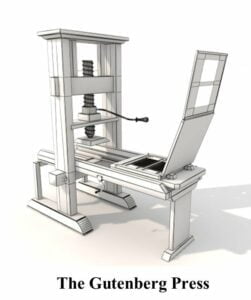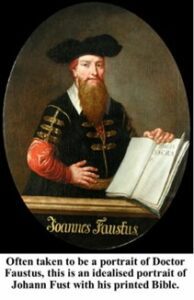
Imagine a world without the printing press and no internet, how would we learn about things?
An inventor was needed.
That person was Johannes Gutenberg who in 1452 invented the printing press.
So, was he the most famous inventor ever?
Who was he and how did he invent the printing press?
Well, he was a political refugee from Mainz, Germany who was living in Strasbourg, France in 1440 when he began trying to create a printing machine, he then moved back to Mainz.
Basically, his incentive was to make money, in fact some say he was desperate to make money.
Before how did they print?
There was a form of basic printing. Letters and images were cut out of wood, then these blocks were dipped in ink and stamped on paper. It was a very time consuming operation, so no big books were printed!
The Gutenberg Press
Gutenberg realised that if he put all the blocks together in a machine, and then, printed on moving paper, everything would be faster. More importantly he could print in volume.
Therefore, he developed a movable type printing method that became known as “the Gutenberg Press”. It was based on a printing system developed by a Chinese inventor, Bi Sheng, in 990–1051 AD. Sheng’s invention didn’t take off as there were so many characters in the Chinese vocabulary, and it only printed single sheets of paper. What Gutenberg did was to develop a mechanised system to transfer the ink to a moving piece of paper.

It worked, eventually!
The Result
For the first time copies of books could be economically printed, which led to the broadcasting of knowledge for the first time in history. It had the same effect on society in those days as the Internet has had today. This is why it is suggested that he is the most famous inventor ever.
The first commercial book he printed was the Bible, which later became known as the Gutenberg Bible.
Did Gutenberg make his fortune
Well, no.
As you can imagine, he needed money to achieve his target.
He was a very talented person who had invented:
- the letters
- the typeface
- the box to hold the letters
- the ink
- the process by which the ink got onto the paper
However, by 1450 he had run out of money. A wealthy lawyer, Johann Fust, lent him 800 guilders, £180,000 in today’s money, to set up a shop, and 300 guilders, £60,00 per year, for its operation. Then in 1452 he lent him a further 800 guilders.
The Gutenberg Bible

Using this money Gutenberg finished the printing press and decided that the first book to be printed would be the bible. It wasn’t because he was religious but because he thought it would make the most money. Over three years from 1452 he printed a 1,286 page bible, which is today known as “the Gutenberg Bible”
Unfortunately, he wasn’t the only person who was in it for the money, Fust was! This meant that before any bibles were sold Fust asked for his money back. He demanded 2026 guilders, £500,000 in today’s money! Gutenberg couldn’t pay him. The result was that Fust forced Gutenberg into bankruptcy. The court then gave Fust the print shop and everything in it as settlement, while also ousting Gutenberg.
Of course, the first thing Fust did was put the bible on the market. However, he refused to sell it as the Gutenberg bible. It was called that several years later.
We don’t know much more about Gutenberg other than that he died a pauper in Mainz in 1468.
So, the man who invented an amazing machine that in 1460 allowed knowledge to flow around the world, at what was in those days was incredible speed, ended up broke!
Slightly different from what happened to those who invented the internet 640 years later, which, now allows knowledge to flow round the world instantly.
Isn’t history interesting?
10 questions to discuss:
- Beyond money: While the blog suggests Gutenberg’s primary incentive was financial, were there any other potential motivations for his invention?
- Challenges of woodblock printing: What specific limitations of woodblock printing led Gutenberg to seek a new method?
- Evolution of the idea: How did Bi Sheng’s printing system influence Gutenberg’s design, and what key improvements did Gutenberg introduce?
- The printing process: Can you explain the specific steps involved in using the Gutenberg Press to print a page?
- Beyond the Bible: What other types of materials did the Gutenberg Press allow for printing besides religious texts?
- Impact on literacy: How did the invention of the printing press contribute to increased literacy rates and wider access to knowledge?
- Spread of information: How did the printing press influence the dissemination of news and ideas during this period?
- Economic consequences: Besides printing books, what other industries might have been impacted by the invention of the printing press?
- Alternative inventors: Were there other individuals around the world working on similar printing technologies at the same time as Gutenberg?
- Legacy beyond fame: While he may not have reaped personal financial rewards, how does Gutenberg’s invention continue to shape the world today?
These questions are to delve deeper into various aspects of this bite, encouraging critical thinking and exploring the broader context of Gutenberg’s invention and its impact.
or more about these people:
http://www.historyworld.net/wrldhis/plaintexthistories.asp?historyid=190
© Tony Dalton

